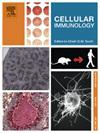自身免疫性疾病中的巨噬细胞异质性
IF 2.9
4区 医学
Q2 CELL BIOLOGY
引用次数: 0
摘要
自身免疫性疾病(艾滋病)的发病机制复杂,其病因尚不清楚,多种细胞类型参与疾病进展。巨噬细胞作为艾滋病中重要的免疫细胞群,在维持免疫稳态中起着关键作用。在传统研究中,巨噬细胞往往被过度简化为M1和M2极化亚型。单细胞RNA测序(scRNA-seq)技术的出现极大地推动了生命科学领域的高通量研究,使细胞和分子水平的深入研究成为可能。这项技术揭示了巨噬细胞的显著异质性,进一步增强了我们对巨噬细胞发育、表型多样性和功能可塑性的理解。此外,它还为探索各种疾病的分子机制提供了新的视角。在本文中,我们全面探讨了不同类型艾滋病中巨噬细胞的异质性,并总结了巨噬细胞定向干预的潜在治疗靶点,旨在为推进艾滋病精准治疗和相关研究提供有价值的理论见解和新的研究方向。本文章由计算机程序翻译,如有差异,请以英文原文为准。
Macrophage heterogeneity in autoimmune diseases
The pathogenesis of autoimmune diseases (AIDs) is complex and their etiology remains unclear, with multiple cell types involved in the disease progression. Macrophages, as a crucial immune cell population in AIDs, play a pivotal role in maintaining immune homeostasis. In traditional research, macrophages are frequently oversimplified into the M1 and M2 polarized subtypes. The advent of single-cell RNA sequencing (scRNA-seq) technology has significantly advanced high-throughput research in the life sciences, enabling in-depth investigations at the cellular and molecular levels. This technology has revealed the significant heterogeneity of macrophages, further enhancing our understanding of their development, phenotypic diversity, and functional plasticity. Additionally, it provides a novel perspective for exploring the molecular mechanisms underlying various diseases. In this review, we comprehensively explore the heterogeneity of macrophages across different AIDs, and summarize potential therapeutic targets for macrophage-directed interventions, aiming to provide valuable theoretical insights and novel research directions to advance precision therapy and related studies in AIDs.
求助全文
通过发布文献求助,成功后即可免费获取论文全文。
去求助
来源期刊

Cellular immunology
生物-免疫学
CiteScore
8.20
自引率
2.30%
发文量
102
审稿时长
30 days
期刊介绍:
Cellular Immunology publishes original investigations concerned with the immunological activities of cells in experimental or clinical situations. The scope of the journal encompasses the broad area of in vitro and in vivo studies of cellular immune responses. Purely clinical descriptive studies are not considered.
Research Areas include:
• Antigen receptor sites
• Autoimmunity
• Delayed-type hypersensitivity or cellular immunity
• Immunologic deficiency states and their reconstitution
• Immunologic surveillance and tumor immunity
• Immunomodulation
• Immunotherapy
• Lymphokines and cytokines
• Nonantibody immunity
• Parasite immunology
• Resistance to intracellular microbial and viral infection
• Thymus and lymphocyte immunobiology
• Transplantation immunology
• Tumor immunity.
 求助内容:
求助内容: 应助结果提醒方式:
应助结果提醒方式:


